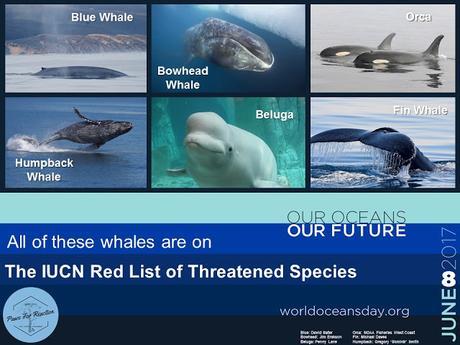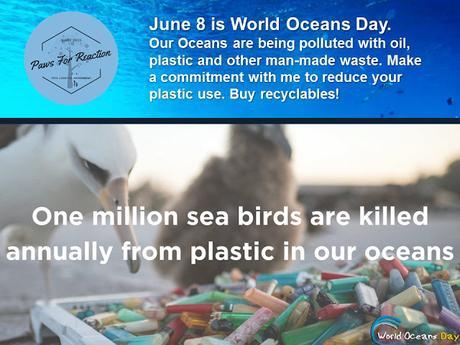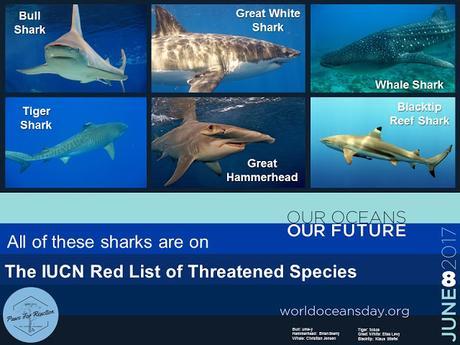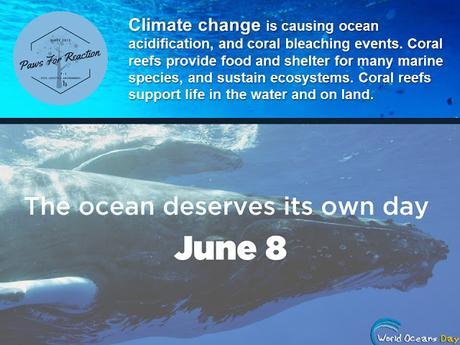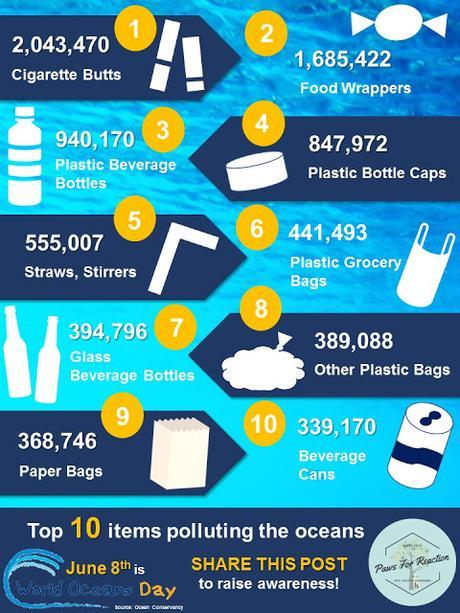World Oceans Day: Fifteen ways to protect the oceansJune 8, 2017- There's no question that I'm jealous of those who get to read their book on the beach, breathing in the salty ocean spray as whales breach in distance. I don't live on a coastline, but I understand how important the oceans are to the balance of the Earth's ecosystem. Like the changing tides, changes in ocean temperatures have an impact on our climate. Not to mention all of the beautiful marine creatures facing extinction if ocean temperatures rise. Those who know me that I LOVE whales! They are ancient creatures that can teach is so much. Whales are extremely smart and intuitive, and each pod has developed their on distinct language to communicate. Sadly, a large number of whales are featured on engendered species lists, like the whales on the IUCN Red List of Threatened Species featured in the photo below. Protecting the whales is just one of the many reasons why I think the ocean's deserve their own day. That day is today: World Oceans Day!
World Oceans DayBy Stacey McIntyre-Gonzalez Copyright©
The plastic plague of the deep, blue seaThe plastic plague has poisoned our oceans, leaving mass destruction to underwater habitats and marine life. But it's not just the underwater creatures that suffer from our throwaway habits- one million sea birds are killed annually from plastic in our oceans. Very little plastic can be recycled and most of it will outlive the person who tossed it away in the first place.
World Ocean Cleanup reports that their are over five trillion pieces of plastic littering the oceans. That's not even including the plastic pollution overtaking freshwater systems. The worst part is that the innocent wildlife are the ones paying for our plastic addiction. Plastic pollution is a huge part of the problem, but their is another threat to our oceans that is far greater.
Warming oceans, changing tides and rising risks
The world's oceans cover about 70 per cent of the Earth. Oceans influence global weather, so when the oceans warm it effects us all, not just those on coastlines. According to the Environmental Protection Agency (EPA) "three independent analyses show that the amount of heat stored in the ocean has increased substantially since the 1950s. Ocean heat content not only determines sea surface temperature, but also affects sea level and currents." As sea surface temperature continues to rise, so do sea levels putting coastal communities at risk. Those most at risk are the coastal indigenous tribes across the world who can't afford to alter their infrastructure to accommodate the coming floods.
Carbon dioxide is dissolved in the world's oceans. We often think of carbon as something that only impacts the atmosphere, but the world's oceans absorb huge amounts of carbon. This makes the oceans more acidic. Ocean acidification is not something that is going to happen in 10-20 years. It is happening right now. Ocean acidification is causing the coral bleaching events that we are seeing on the Great Barrier Reef, and many other coral reefs.
Ocean acidification also makes it more difficult for some species of marine animals to build their protective shells or skeletons. Oceans that are warmer and more acidic may allow some species, like phytoplankton, to thrive. Unfortunately, many marine creatures are threatened with extinction. Widespread species loss will greatly impact the biodiversity of the planet.Swimming for change, wading for a better futureSpecies loss from the pollution, warming and acidification of the oceans is already taking place, and the losses are heartbreaking. Since many creatures live both on land and in the water, all types of wildlife will be impacted- not just marine life. The oceans provide balance to the planet. Our anthropogenic civilization and the nature we take for granted is off balance. It's time for change.It's not too late for the oceans, the Great Barrier Reef, the Hammerhead or the Orca. There is still time to protect the oceans and the many marine species that are threatened by pollution and climate change. While it's uncertain if we can completely reverse the damage already done the oceans, we can make a positive impact by altering our actions going forward. A shift is taking place right now and the tides are changing- it's the dawn of the renewable revolution. Across the planet people are organizing and committing to preserving the oceans. Will you join in the fight on World Oceans Day? Here's how you can make a positive impact on the ocean.
15 things you can do to help protect the oceans
1. Educate yourself: Knowledge is power. Learn about the ocean and marine life. Research what species are at risk in your area. Learn about what problems the oceans and watersheds around you are facing, and any actions being taken to try and solve them.2. Reduce your carbon footprint: Slowing down the effects of climate change will have a huge impact on the ocean. Reduce your energy consumption and your green house gas emissions. Support companies that are sustainable, shop local, grow your own food and ensure your housewares and appliances are energy efficient. Use public transportation, walk of cycle. Purchase carbon offsets to lower your personal carbon footprint. 3. Use less plastic products: Plastic pollution is one of the biggest threats to the health and biodiversity of our oceans. Items like plastic bags, bottles, packaging and containers, toothbrushes, utensils and dishware- list goes on! There are so many plastics in the oceans that some marine creatures have even used plastic materials in place of a shell. Marine life is being poisoned and killed by our plastic pollution. Animals are being strangled, deformed and displaced. Shopping fresh produce and less packaged food items can help reduce plastic use- so can shopping local farmers markets that don't need to ship items. Recycling properly, buying used items, repairing items that break- these are all ways to reduce plastic waste. Take the Better Bag Challengeand commit to no plastic bags- I did! 4. Know your seafood: Seafood is the primary protein in the diets of many cultures across the planet. Before you buy, make sure that your seafood is sourced in a sustainable way. Overfishing, illegal fishing and bycatch are depleting our oceans. So if you like a certain type of fish, research where that fish is sourced, and purchase from the most sustainable source. Remember, how we spend our money informs the future choices of governments, groups and industries. So if your eating something from the deep blue; go green!5. Be a responsibly pet owner: Always clean up after your pet outside. Use compostable dog poop-bags. Never flush cat litter down the toilet. Shop sustainable pet food. Human-grade pet food options put a larger strain on the global food system. It's also important to be responsible when selecting your pet. If you are deciding what fish to add to your fishbowl, research first how the species you are interested in is obtained from the wild, and what the environmental impacts are. Never own an endangered species as a pet.6. Clean-up beaches and shorelines: Organize a group or do it yourself! It doesn't matter if you live beside an ocean, river, lake or stream. Grab a couple bags and a pair of gardening gloves and pick up some trash. I like to bring along a few bags so I can sort recyclable materials. It's simple, positive action. 7. Support organizations that support the ocean: Support and donate to organizations committed to protecting oceans and water systems. These organizations need funding for clean-ups, research and events that raise awareness. Some organizations you can support include Oceana, Ocean Conservancy, World Wildlife Fund, Greenpeace, and Sierra Club.8. Shop responsibly: Don't buy products that exploit marine life, or that pollute the oceans during their production process. Products like coral jewelry, tortoiseshell fashion items and shark products exploit underwater creatures. Often the items used to make these products come from endangered species that are hunted illegally. Purchase sustainable products with low environmental impacts. Don't purchase items with micro-beads. These and other micro-plastics are harming shellfish species. 9. Contact local policy makers: Find out what policies and programs are in place to protect the oceans- and what policies are missing. Call your local leader and lobby for more protection of your local water system. Attend town halls to voice your concerns about clean water and ocean conservation. 10. Use the oceans responsibly: If you are boating, canoeing, paddling or kayaking, never throw trash into the ocean. Be mindful of marine creatures and their habitats. It's important to leave no trace when traveling the oceans and shorelines.11. Dispose of hazardous materials properly: Batteries, motor oil, medications, household chemicals and cleaners- all of these items can threaten the health of our oceans. Learn how you can dispose of these items properly in your community.12. Use less fertilizers: Many fertilizers used for gardening and agriculture end up in the world's oceans; the excess running off land and creating dead-zones in the water where all life is lost. These dead-zones are extremely difficult to reverse. Dead-zones have very low amounts of oxygen in the water- which marine life like fish and shrimp need to survive. 13. Vote to protect oceans: Vote for leaders who will commit to supporting healthy oceans. Don't vote for policy makers who want to cut funding to environmental programs and research, censor science and deny climate change. Vote for leaders who want to clean-up the oceans and preserve it's biodiversity. 14. Eat less fish and meat: Agriculture has a huge impact on the ocean and climate change. Methane and waste runoff from farms can pollute wells and watersheds. Farms and animal agriculture use large amounts of water to operate. Overfishing decreases biodiversity in the ocean. If each person made a commitment to eat less meat and moved to a more plant-based diet, the health of the ocean would improve dramatically. 15. Spread the word: Raise awareness on social media, talk to your family and friends and get involved with groups that protect the oceans. Share this post- all of the photos are free for you to share!
